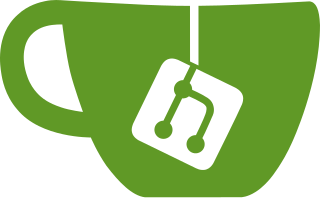TeamForge is a proprietary collaborative application lifecycle management forge supporting version control and a software development management system.
SourceForge is a web service that offers software consumers a centralized online location to control and manage open-source software projects and research business software. It provides source code repository hosting, bug tracking, mirroring of downloads for load balancing, a wiki for documentation, developer and user mailing lists, user-support forums, user-written reviews and ratings, a news bulletin, micro-blog for publishing project updates, and other features.
BitKeeper is a software tool for distributed revision control of computer source code. Originally developed as proprietary software by BitMover Inc., a privately held company based in Los Gatos, California, it was released as open-source software under the Apache-2.0 license on 9 May 2016. BitKeeper is no longer being developed.
In software engineering, a project fork happens when developers take a copy of source code from one software package and start independent development on it, creating a distinct and separate piece of software. The term often implies not merely a development branch, but also a split in the developer community; as such, it is a form of schism. Grounds for forking are varying user preferences and stagnated or discontinued development of the original software.
Source-available software is software released through a source code distribution model that includes arrangements where the source can be viewed, and in some cases modified, but without necessarily meeting the criteria to be called open-source. The licenses associated with the offerings range from allowing code to be viewed for reference to allowing code to be modified and redistributed for both commercial and non-commercial purposes.

Netatalk is a free, open-source implementation of the Apple Filing Protocol (AFP). It allows Unix-like operating systems to serve as file server for Macintosh computers running macOS or Classic Mac OS.
The Common Development and Distribution License (CDDL) is a free and open-source software license, produced by Sun Microsystems, based on the Mozilla Public License (MPL). Files licensed under the CDDL can be combined with files licensed under other licenses, whether open source or proprietary. In 2005 the Open Source Initiative approved the license. The Free Software Foundation (FSF) considers it a free software license, but one which is incompatible with the GNU General Public License (GPL).
In software development, distributed version control is a form of version control in which the complete codebase, including its full history, is mirrored on every developer's computer. Compared to centralized version control, this enables automatic management branching and merging, speeds up most operations, improves the ability to work offline, and does not rely on a single location for backups. Git, the world's most popular version control system, is a distributed version control system.
In software development, a codebase is a collection of source code used to build a particular software system, application, or software component. Typically, a codebase includes only human-written source code system files; thus, a codebase usually does not include source code files generated by tools or binary library files, as they can be built from the human-written source code. However, it generally does include configuration and property files, as they are the data necessary for the build.
A source-code-hosting facility is a file archive and web hosting facility for source code of software, documentation, web pages, and other works, accessible either publicly or privately. They are often used by open-source software projects and other multi-developer projects to maintain revision and version history, or version control. Many repositories provide a bug tracking system, and offer release management, mailing lists, and wiki-based project documentation. Software authors generally retain their copyright when software is posted to a code hosting facilities.

Mercurial is a distributed revision control tool for software developers. It is supported on Microsoft Windows and Unix-like systems, such as FreeBSD, macOS, and Linux.

GNU Bazaar is a distributed and client–server revision control system sponsored by Canonical.
In FOSS development communities, a forge is a web-based collaborative software platform for both developing and sharing computer applications. The term forge refers to a common prefix or suffix adopted by various platforms created after the example of SourceForge. This usage of the word stems from the metalworking forge, used for shaping metal parts.
Companies whose business centers on the development of open-source software employ a variety of business models to solve the challenge of how to make money providing software that is by definition licensed free of charge. Each of these business strategies rests on the premise that users of open-source technologies are willing to purchase additional software features under proprietary licenses, or purchase other services or elements of value that complement the open-source software that is core to the business. This additional value can be, but not limited to, enterprise-grade features and up-time guarantees to satisfy business or compliance requirements, performance and efficiency gains by features not yet available in the open source version, legal protection, or professional support/training/consulting that are typical of proprietary software applications.

The GNU General Public License is a series of widely used free software licenses that guarantee end users the four freedoms to run, study, share, and modify the software. The license was the first copyleft for general use and was originally written by the founder of the Free Software Foundation (FSF), Richard Stallman, for the GNU Project. The license grants the recipients of a computer program the rights of the Free Software Definition. These GPL series are all copyleft licenses, which means that any derivative work must be distributed under the same or equivalent license terms. It is more restrictive than the Lesser General Public License and even further distinct from the more widely used permissive software licenses BSD, MIT, and Apache.

RhodeCode is an open source self-hosted platform for behind-the-firewall source code management. It provides centralized control over Git, Mercurial, and Subversion repositories within an organization, with common authentication and permission management. RhodeCode allows forking, pull requests, and code reviews via a web interface.
Software relicensing is applied in open-source software development when software licenses of software modules are incompatible and are required to be compatible for a greater combined work. Licenses applied to software as copyrightable works, in source code as binary form, can contain contradictory clauses. These requirements can make it impossible to combine source code or content of several software works to create a new combined one.
metasfresh is an open source/free ERP software designed and developed for SMEs. metasfresh is an actively maintained fork of ADempiere and can be used and distributed freely. It does not require a contributor license agreement from partners or contributors. There is no closed source code, and the planning and development happen openly in the community. metasfresh was included in the Top 9 Open Source ERP to consider by opensource.com.

Gitea is a forge software package for hosting software development version control using Git as well as other collaborative features like bug tracking, code review, kanban boards, tickets, and wikis. It supports self-hosting but also provides a free public first-party instance. It is a fork of Gogs and is written in Go. Gitea can be hosted on all platforms supported by Go including Linux, macOS, and Windows. The project is funded on Open Collective.







